中国语言禁忌
- 格式:doc
- 大小:32.00 KB
- 文档页数:2
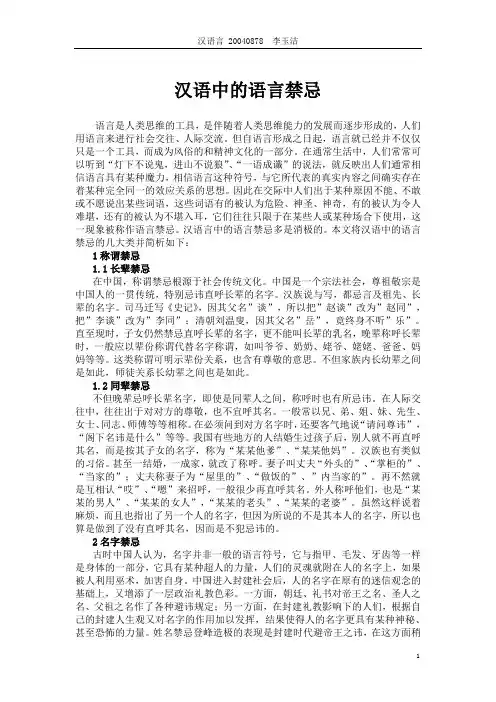
汉语中的语言禁忌语言是人类思维的工具,是伴随着人类思维能力的发展而逐步形成的,人们用语言来进行社会交往、人际交流。
但自语言形成之日起,语言就已经并不仅仅只是一个工具,而成为风俗的和精神文化的一部分。
在通常生活中,人们常常可以听到“灯下不说鬼,进山不说狼”、“一语成谶”的说法,就反映出人们通常相信语言具有某种魔力,相信语言这种符号,与它所代表的真实内容之间确实存在着某种完全同一的效应关系的思想。
因此在交际中人们出于某种原因不能、不敢或不愿说出某些词语,这些词语有的被认为危险、神圣、神奇,有的被认为令人难堪,还有的被认为不堪入耳,它们往往只限于在某些人或某种场合下使用,这一现象被称作语言禁忌。
汉语言中的语言禁忌多是消极的。
本文将汉语中的语言禁忌的几大类并简析如下:1称谓禁忌1.1长辈禁忌在中国,称谓禁忌根源于社会传统文化。
中国是一个宗法社会,尊祖敬宗是中国人的一贯传统,特别忌讳直呼长辈的名字。
汉族说与写,都忌言及祖先、长辈的名字。
司马迁写《史记》,因其父名”谈”,所以把”赵谈”改为”赵同”,把”李谈”改为”李同”;清朝刘温叟,因其父名”岳”,竟终身不听”乐”。
直至现时,子女仍然禁忌直呼长辈的名字,更不能叫长辈的乳名,晚辈称呼长辈时,一般应以辈份称谓代替名字称谓,如叫爷爷、奶奶、姥爷、姥姥、爸爸、妈妈等等。
这类称谓可明示辈份关系,也含有尊敬的意思。
不但家族内长幼辈之间是如此,师徒关系长幼辈之间也是如此。
1.2同辈禁忌不但晚辈忌呼长辈名字,即使是同辈人之间,称呼时也有所忌讳。
在人际交往中,往往出于对对方的尊敬,也不宜呼其名。
一般常以兄、弟、姐、妹、先生、女士、同志、师傅等等相称。
在必须问到对方名字时,还要客气地说“请问尊讳”,“阁下名讳是什么”等等。
我国有些地方的人结婚生过孩子后,别人就不再直呼其名,而是按其子女的名字,称为“某某他爹”、“某某他妈”。
汉族也有类似的习俗。
甚至一结婚,一成家,就改了称呼。

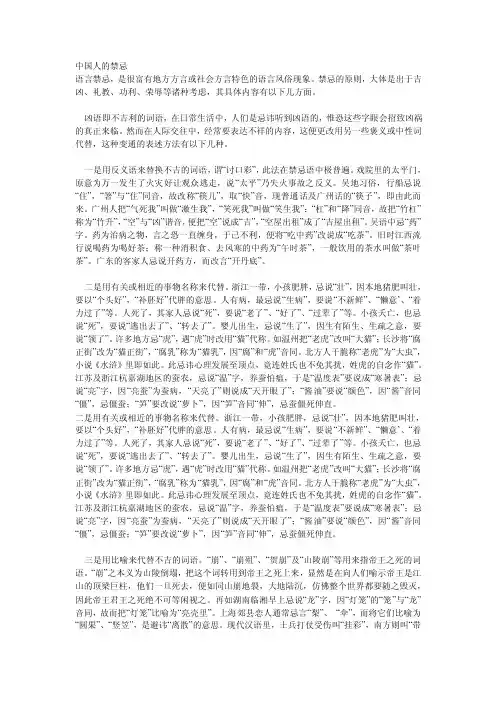
中国人的禁忌语言禁忌,是很富有地方方言或社会方言特色的语言风俗现象。
禁忌的原则,大体是出于吉凶、礼教、功利、荣辱等诸种考虑,其具体内容有以下几方面。
凶语即不吉利的词语,在日常生活中,人们是忌讳听到凶语的,惟恐这些字眼会招致凶祸的真正来临。
然而在人际交往中,经常要表达不祥的内容,这便更改用另一些褒义或中性词代替,这种变通的表述方法有以下几种。
一是用反义语来替换不吉的词语,谓“讨口彩”,此法在禁忌语中极普遍。
戏院里的太平门,原意为万一发生了火灾好让观众逃走,说“太平”乃失火事故之反义。
吴地习俗,行船忌说“住”,“箸”与“住”同音,故改称“筷儿”,取“快”音,现普通话及广州话的“筷子”,即由此而来。
广州人把“气死我”叫做“激生我”,“笑死我”叫做“笑生我”;“杠”和“降”同音,故把“竹杠”称为“竹升”,“空”与“凶”谐音,便把“空”说成“吉”,“空屋出租”成了“吉屋出租”。
吴语中忌“药”字。
药为治病之物,言之恐一直缠身,于己不利,便将“吃中药”改说成“吃茶”。
旧时江西流行说喝药为喝好茶;称一种消积食、去风寒的中药为“午时茶”,一般饮用的茶水叫做“茶叶茶”。
广东的客家人忌说开药方,而改言“开丹底”。
二是用有关或相近的事物名称来代替。
浙江一带,小孩肥胖,忌说“壮”,因本地猪肥叫壮,要以“个头好”,“补胚好”代胖的意思。
人有病,最忌说“生病”,要说“不新鲜”、“懒意‟、“着力过了”等。
人死了,其家人忌说“死”,要说“老了”、“好了”、“过辈了”等。
小孩夭亡,也忌说“死”,要说“逃出去了”、“转去了”。
婴儿出生,忌说“生了”,因生有陌生、生疏之意,要说“领了”。
许多地方忌“虎”,遇“虎”时改用“猫”代称。
如温州把“老虎”改叫“大猫”;长沙将“腐正街”改为“猫正街”,“腐乳”称为“猫乳”,因“腐”和“虎”音同。
北方人干脆称“老虎”为“大虫”,小说《水浒》里即如此。
此忌讳心理发展至顶点,竟连姓氏也不免其扰,姓虎的自念作“猫”。
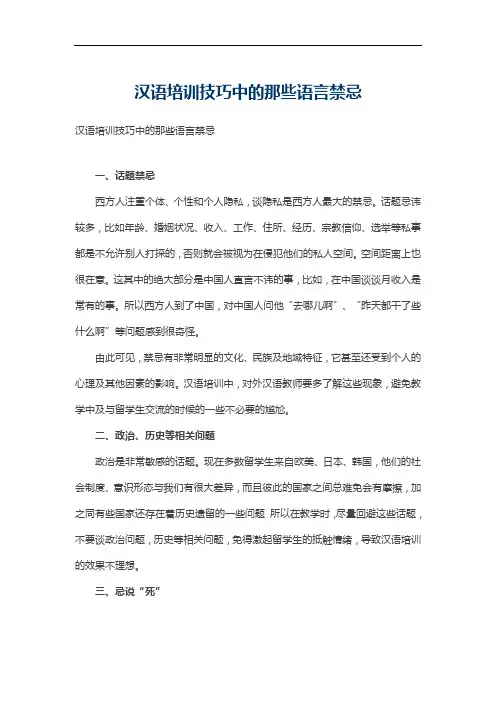
汉语培训技巧中的那些语言禁忌汉语培训技巧中的那些语言禁忌一、话题禁忌西方人注重个体、个性和个人隐私,谈隐私是西方人最大的禁忌。
话题忌讳较多,比如年龄、婚姻状况、收入、工作、住所、经历、宗教信仰、选举等私事都是不允许别人打探的,否则就会被视为在侵犯他们的私人空间。
空间距离上也很在意。
这其中的绝大部分是中国人直言不讳的事,比如,在中国谈谈月收入是常有的事。
所以西方人到了中国,对中国人问他“去哪儿啊”、“昨天都干了些什么啊”等问题感到很奇怪。
由此可见,禁忌有非常明显的文化、民族及地域特征,它甚至还受到个人的心理及其他因素的影响。
汉语培训中,对外汉语教师要多了解这些现象,避免教学中及与留学生交流的时候的一些不必要的尴尬。
二、政治、历史等相关问题政治是非常敏感的话题。
现在多数留学生来自欧美、日本、韩国,他们的社会制度、意识形态与我们有很大差异,而且彼此的国家之间总难免会有摩擦,加之同有些国家还存在着历史遗留的一些问题所以在教学时,尽量回避这些话题,不要谈政治问题,历史等相关问题,免得激起留学生的抵触情绪,导致汉语培训的效果不理想。
三、忌说“死”“死”是全人类共同的归宿,对于死者和生者来说,死亡都是一种不愉快的事,是残酷的,是人们恐惧和忌讳的话题,所有国家的人都忌说“死”,因此在交际中不要轻易出现死这一字眼,必须表达这个意思的时候,往往采用较模糊的概念来表达,用委婉语使死亡的色彩更淡一点。
如:汉语中用逝世、仙游、走了、驾鹤西归等词,但要注意这类词语外国人是否能够理解。
再如,在中国,人们认为年龄大的人的死亡是“寿终正寝”,是一件喜事,这也是西方人弄不明白的“红白喜事”的由来。
四、忌谈宗教信仰和神灵人都有自己的信仰,而且很多人有宗教信仰。
这也是人们普遍不谈的`话题。
由于文化传统的差异,这类话题在语言上要掌握好分寸。
五、“老”在中西方的差异不同文化的国家,人们对老的表达也不同。
在中国,老人是受人尊敬,尊老爱幼历来是中国人的美德,老是阅历深,成熟之意,所以中国的老年人并不会因为别人直接称呼他们“老人家”而生气,反而认为在他们的姓氏后面加个“老”字是对他们的恭敬,而且中国的老人多能以自身丰富的阅历来帮助年轻人,“老”在中国就成了智慧的代名词。
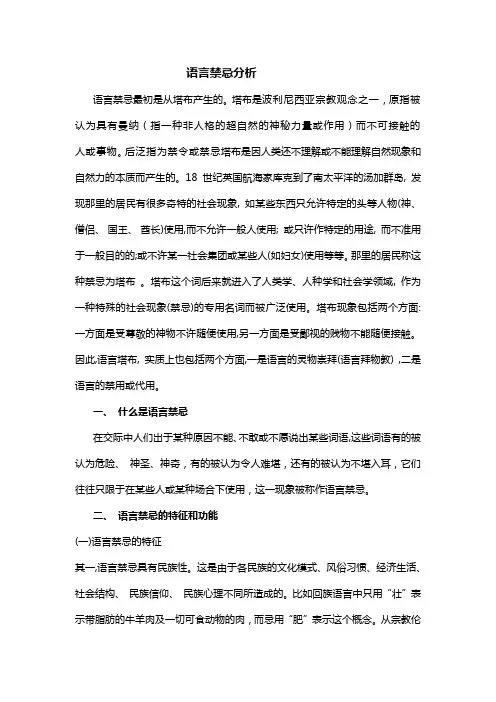
语言禁忌分析语言禁忌最初是从塔布产生的。
塔布是波利尼西亚宗教观念之一,原指被认为具有曼纳(指一种非人格的超自然的神秘力量或作用)而不可接触的人或事物。
后泛指为禁令或禁忌塔布是因人类还不理解或不能理解自然现象和自然力的本质而产生的。
18 世纪英国航海家库克到了南太平洋的汤加群岛, 发现那里的居民有很多奇特的社会现象, 如某些东西只允许特定的头等人物(神、僧侣、国王、酋长)使用,而不允许一般人使用; 或只许作特定的用途, 而不准用于一般目的的;或不许某一社会集团或某些人(如妇女)使用等等。
那里的居民称这种禁忌为塔布。
塔布这个词后来就进入了人类学、人种学和社会学领域, 作为一种特殊的社会现象(禁忌)的专用名词而被广泛使用。
塔布现象包括两个方面:一方面是受尊敬的神物不许随便使用,另一方面是受鄙视的贱物不能随便接触。
因此,语言塔布, 实质上也包括两个方面,一是语言的灵物崇拜(语言拜物教) ,二是语言的禁用或代用。
一、什么是语言禁忌在交际中人们出于某种原因不能、不敢或不愿说出某些词语,这些词语有的被认为危险、神圣、神奇,有的被认为令人难堪,还有的被认为不堪入耳,它们往往只限于在某些人或某种场合下使用,这一现象被称作语言禁忌。
二、语言禁忌的特征和功能(一)语言禁忌的特征其一,语言禁忌具有民族性。
这是由于各民族的文化模式、风俗习惯、经济生活、社会结构、民族信仰、民族心理不同所造成的。
比如回族语言中只用“壮”表示带脂肪的牛羊肉及一切可食动物的肉,而忌用“肥”表示这个概念。
从宗教伦理上看,回族禁食猪肉,肥会让人联想到猪肉,给人以某种不适的感受,所以,为了从心理上严格区别牛羊肉与猪肉的界限,就忌用“肥”字。
回族语言中禁忌“杀牛”、“杀鸡”、“杀羊”,而代之以“宰牛”、“宰鸡”、“宰羊”。
在我国以游牧为主的青藏高原一些地区,人们忌讳说熊、狼、雪豹等动物,而代之以“创上者”、“拴嘴”、“长尾巴”等。
而汉人就没有这些禁忌。
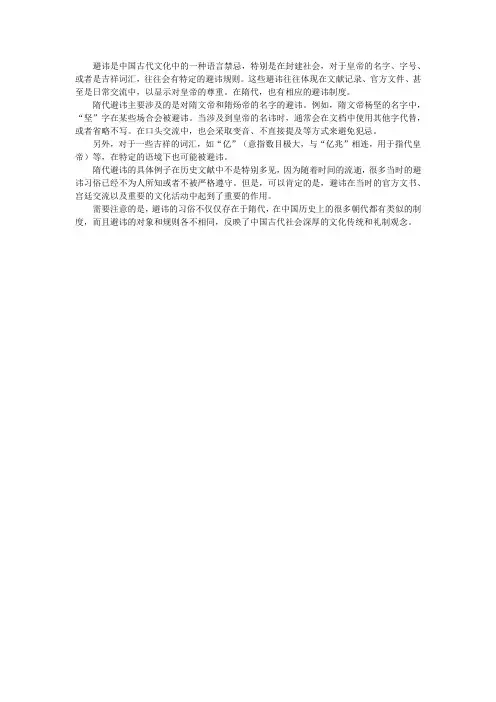
避讳是中国古代文化中的一种语言禁忌,特别是在封建社会,对于皇帝的名字、字号、或者是吉祥词汇,往往会有特定的避讳规则。
这些避讳往往体现在文献记录、官方文件、甚至是日常交流中,以显示对皇帝的尊重。
在隋代,也有相应的避讳制度。
隋代避讳主要涉及的是对隋文帝和隋炀帝的名字的避讳。
例如,隋文帝杨坚的名字中,“坚”字在某些场合会被避讳。
当涉及到皇帝的名讳时,通常会在文档中使用其他字代替,或者省略不写。
在口头交流中,也会采取变音、不直接提及等方式来避免犯忌。
另外,对于一些吉祥的词汇,如“亿”(意指数目极大,与“亿兆”相连,用于指代皇帝)等,在特定的语境下也可能被避讳。
隋代避讳的具体例子在历史文献中不是特别多见,因为随着时间的流逝,很多当时的避讳习俗已经不为人所知或者不被严格遵守。
但是,可以肯定的是,避讳在当时的官方文书、宫廷交流以及重要的文化活动中起到了重要的作用。
需要注意的是,避讳的习俗不仅仅存在于隋代,在中国历史上的很多朝代都有类似的制度,而且避讳的对象和规则各不相同,反映了中国古代社会深厚的文化传统和礼制观念。
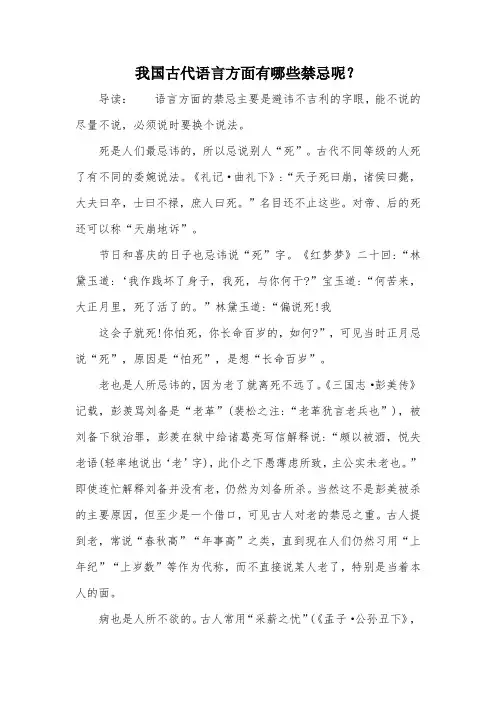
我国古代语言方面有哪些禁忌呢?导读:语言方面的禁忌主要是避讳不吉利的字眼,能不说的尽量不说,必须说时要换个说法。
死是人们最忌讳的,所以忌说别人“死”。
古代不同等级的人死了有不同的委婉说法。
《礼记·曲礼下》:“天子死曰崩,诸侯曰薨,大夫曰卒,士曰不禄,庶人曰死。
”名目还不止这些。
对帝、后的死还可以称“天崩地诉”。
节日和喜庆的日子也忌讳说“死”字。
《红梦梦》二十回:“林黛玉道:‘我作践坏了身子,我死,与你何干?”宝玉道:“何苦来,大正月里,死了活了的。
”林黛玉道:“偏说死!我这会子就死!你怕死,你长命百岁的,如何?”,可见当时正月忌说“死”,原因是“怕死”,是想“长命百岁”。
老也是人所忌讳的,因为老了就离死不远了。
《三国志·彭美传》记载,彭羡骂刘备是“老革”(裴松之注:“老革犹言老兵也”),被刘备下狱治罪,彭羡在狱中给诸葛亮写信解释说:“颇以被酒,悦失老语(轻率地说出‘老’字),此仆之下愚薄虑所致,主公实未老也。
”即使连忙解释刘备并没有老,仍然为刘备所杀。
当然这不是彭美被杀的主要原因,但至少是一个借口,可见古人对老的禁忌之重。
古人提到老,常说“春秋高”“年事高”之类,直到现在人们仍然习用“上年纪”“上岁数”等作为代称,而不直接说某人老了,特别是当着本人的面。
病也是人所不欲的。
古人常用“采薪之忧”(《孟子·公孙丑下》,意思是不能上山砍柴了),现在我们还常用“不舒服”代替有病。
此外,古人还忌说“罚”字。
在喝酒的时候,如果要罚对方饮酒,通常说“饮”某某或“浮”某某,而不说“罚”某某。
饮是斟好酒让对方喝的意思,浮是给对方斟满酒的意思。
饮酒是高兴的事,不能说“罚”字扫大家的兴。
颠倒、翻转、反背之类的话都在忌讳之列。
古代的禁忌是很多的,涉及各个方面,其核心是抑制不祥。
避免不祥,本是人之常情,无可非议,但古往今来许多禁忌带有浓厚的迷信成分,这些禁忌则是有害无益的。
感谢您的阅读,本文如对您有帮助,可下载编辑,谢谢。
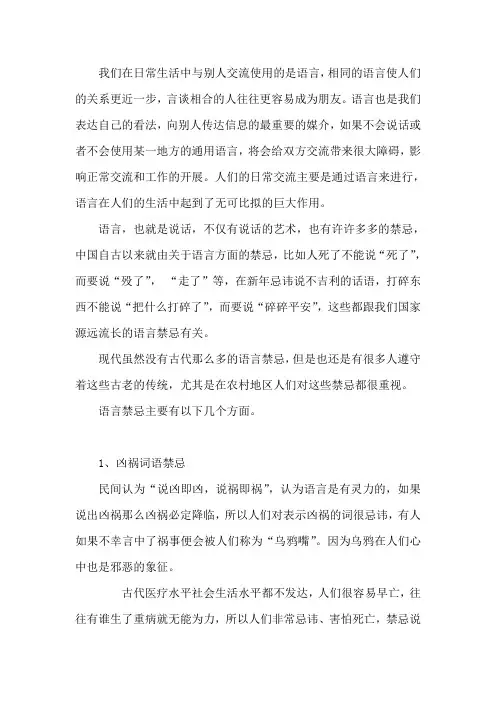
我们在日常生活中与别人交流使用的是语言,相同的语言使人们的关系更近一步,言谈相合的人往往更容易成为朋友。
语言也是我们表达自己的看法,向别人传达信息的最重要的媒介,如果不会说话或者不会使用某一地方的通用语言,将会给双方交流带来很大障碍,影响正常交流和工作的开展。
人们的日常交流主要是通过语言来进行,语言在人们的生活中起到了无可比拟的巨大作用。
语言,也就是说话,不仅有说话的艺术,也有许许多多的禁忌,中国自古以来就由关于语言方面的禁忌,比如人死了不能说“死了”,而要说“殁了”,“走了”等,在新年忌讳说不吉利的话语,打碎东西不能说“把什么打碎了”,而要说“碎碎平安”,这些都跟我们国家源远流长的语言禁忌有关。
现代虽然没有古代那么多的语言禁忌,但是也还是有很多人遵守着这些古老的传统,尤其是在农村地区人们对这些禁忌都很重视。
语言禁忌主要有以下几个方面。
1、凶祸词语禁忌民间认为“说凶即凶,说祸即祸”,认为语言是有灵力的,如果说出凶祸那么凶祸必定降临,所以人们对表示凶祸的词很忌讳,有人如果不幸言中了祸事便会被人们称为“乌鸦嘴”。
因为乌鸦在人们心中也是邪恶的象征。
古代医疗水平社会生活水平都不发达,人们很容易早亡,往往有谁生了重病就无能为力,所以人们非常忌讳、害怕死亡,禁忌说出跟死亡有关的词语,话句。
“死”字是不能万万提及的。
《礼记·曲礼》上面记载:“天子死曰崩,诸侯曰薨,大夫曰卒,士曰不禄,庶人曰死。
”就是说,天子去世不能说“死”,而要说“崩”,即人们常听到的“驾崩”,这大概是取“天崩地裂”之意,诸侯王爷去世要说“薨”,大夫,即古代的官员,去世后要说“卒”,士,即地位较高的文人等,去世要说“不禄”,只有平民去世时才说“死”字,这一方面体现出当时平民社会地位的低下,另一方面也体现出人们对“死”字的忌讳。
因为人们极度忌讳“死”字,所以在不得不说这个字时就想了很多可以代替此字的,含有去世的意思的其他词语来代替。
这种做法不仅在汉族流行,其他少数民族也流行这样的做法。
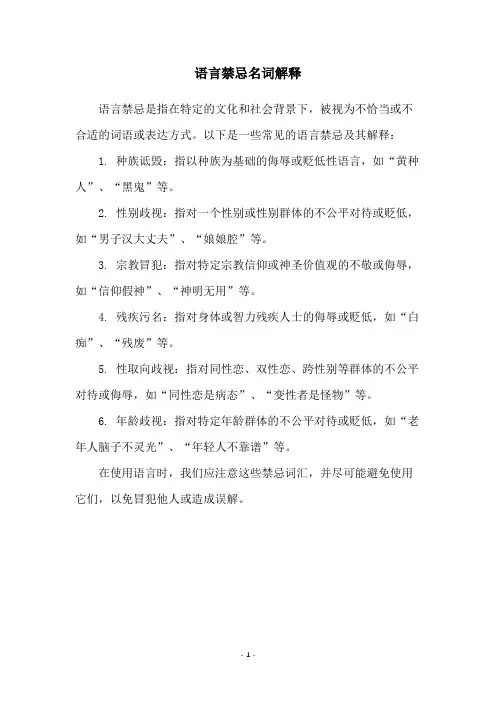
语言禁忌名词解释
语言禁忌是指在特定的文化和社会背景下,被视为不恰当或不合适的词语或表达方式。
以下是一些常见的语言禁忌及其解释:
1. 种族诋毁:指以种族为基础的侮辱或贬低性语言,如“黄种人”、“黑鬼”等。
2. 性别歧视:指对一个性别或性别群体的不公平对待或贬低,如“男子汉大丈夫”、“娘娘腔”等。
3. 宗教冒犯:指对特定宗教信仰或神圣价值观的不敬或侮辱,如“信仰假神”、“神明无用”等。
4. 残疾污名:指对身体或智力残疾人士的侮辱或贬低,如“白痴”、“残废”等。
5. 性取向歧视:指对同性恋、双性恋、跨性别等群体的不公平对待或侮辱,如“同性恋是病态”、“变性者是怪物”等。
6. 年龄歧视:指对特定年龄群体的不公平对待或贬低,如“老年人脑子不灵光”、“年轻人不靠谱”等。
在使用语言时,我们应注意这些禁忌词汇,并尽可能避免使用它们,以免冒犯他人或造成误解。
- 1 -。
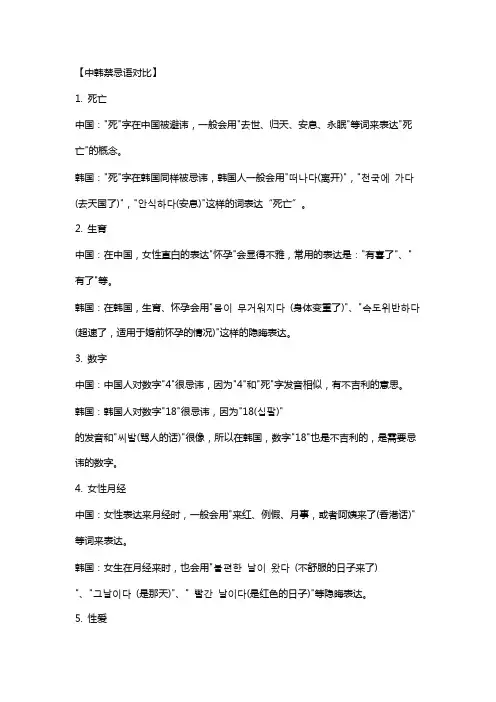
【中韩禁忌语对比】1. 死亡中国:"死"字在中国被避讳,一般会用"去世、归天、安息、永眠"等词来表达"死亡"的概念。
韩国:"死"字在韩国同样被忌讳,韩国人一般会用"떠나다(离开)","천국에가다(去天国了)","안식하다(安息)"这样的词表达“死亡”。
2. 生育中国:在中国,女性直白的表达"怀孕"会显得不雅,常用的表达是:"有喜了"、"有了"等。
韩国:在韩国,生育、怀孕会用"몸이무거워지다(身体变重了)"、"속도위반하다(超速了,适用于婚前怀孕的情况)"这样的隐晦表达。
3. 数字中国:中国人对数字"4"很忌讳,因为"4"和"死"字发音相似,有不吉利的意思。
韩国:韩国人对数字"18"很忌讳,因为"18(십팔)"的发音和"씨발(骂人的话)"很像,所以在韩国,数字"18"也是不吉利的,是需要忌讳的数字。
4. 女性月经中国:女性表达来月经时,一般会用"来红、例假、月事,或者阿姨来了(香港话)"等词来表达。
韩国:女生在月经来时,也会用"불편한날이왔다(不舒服的日子来了) "、"그날이다(是那天)"、" 빨간날이다(是红色的日子)"等隐晦表达。
5. 性爱中国:中国人对于性字避而不谈,有时会用“风月之事”“翻云覆雨”等词来表达。
韩国:对于具有传统思想的韩国人,也同样羞于提及性行为,同样被认为是需要忌讳的,一般会用"방문을닫다(关上房门)"、"침대로향하다(走向床) "、"머리를올리다(扎起头发。
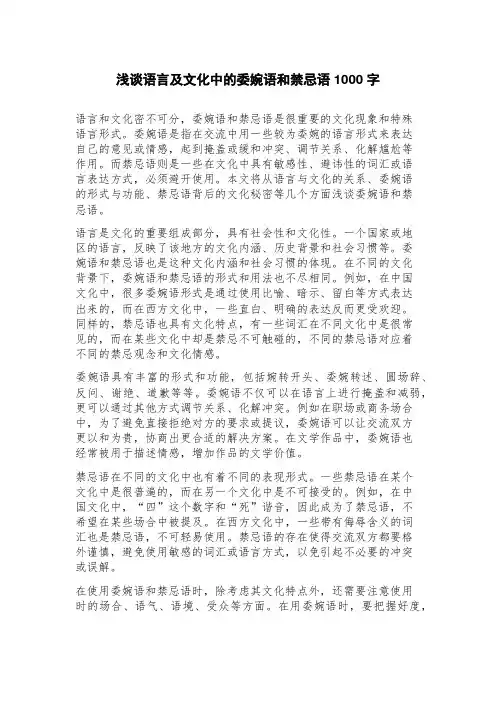
浅谈语言及文化中的委婉语和禁忌语1000字语言和文化密不可分,委婉语和禁忌语是很重要的文化现象和特殊语言形式。
委婉语是指在交流中用一些较为委婉的语言形式来表达自己的意见或情感,起到掩盖或缓和冲突、调节关系、化解尴尬等作用。
而禁忌语则是一些在文化中具有敏感性、避讳性的词汇或语言表达方式,必须避开使用。
本文将从语言与文化的关系、委婉语的形式与功能、禁忌语背后的文化秘密等几个方面浅谈委婉语和禁忌语。
语言是文化的重要组成部分,具有社会性和文化性。
一个国家或地区的语言,反映了该地方的文化内涵、历史背景和社会习惯等。
委婉语和禁忌语也是这种文化内涵和社会习惯的体现。
在不同的文化背景下,委婉语和禁忌语的形式和用法也不尽相同。
例如,在中国文化中,很多委婉语形式是通过使用比喻、暗示、留白等方式表达出来的,而在西方文化中,一些直白、明确的表达反而更受欢迎。
同样的,禁忌语也具有文化特点,有一些词汇在不同文化中是很常见的,而在某些文化中却是禁忌不可触碰的,不同的禁忌语对应着不同的禁忌观念和文化情感。
委婉语具有丰富的形式和功能,包括婉转开头、委婉转述、圆场辞、反问、谢绝、道歉等等。
委婉语不仅可以在语言上进行掩盖和减弱,更可以通过其他方式调节关系、化解冲突。
例如在职场或商务场合中,为了避免直接拒绝对方的要求或提议,委婉语可以让交流双方更以和为贵,协商出更合适的解决方案。
在文学作品中,委婉语也经常被用于描述情感,增加作品的文学价值。
禁忌语在不同的文化中也有着不同的表现形式。
一些禁忌语在某个文化中是很普遍的,而在另一个文化中是不可接受的。
例如,在中国文化中,“四”这个数字和“死”谐音,因此成为了禁忌语,不希望在某些场合中被提及。
在西方文化中,一些带有侮辱含义的词汇也是禁忌语,不可轻易使用。
禁忌语的存在使得交流双方都要格外谨慎,避免使用敏感的词汇或语言方式,以免引起不必要的冲突或误解。
在使用委婉语和禁忌语时,除考虑其文化特点外,还需要注意使用时的场合、语气、语境、受众等方面。
中国禁忌语举例【篇一:中国禁忌语举例】委婉语,比如解手,禁忌语:过去皇帝死亡不能叫死,教驾崩,敬语就是尊称,令尊,谦语就是自谦,比如:鄙人【篇二:中国禁忌语举例】四川大学锦城学院本科毕业论文中国古代社会的女性禁忌语四川大学锦城学院本科毕业论文中国古代社会的女性禁忌语禁忌是一种社会现象,社会的禁忌必然会反映到语言之中,也就是所谓的禁忌语言。
禁忌语就是在语言交际中是不能随便说的,说出来就可能会引起听话人的不快和反感的语言,可能因社会、地区、情景、地方、民族、文化、场合、性别等因素而异。
性别的不同是人类社会的自然现象,男女在使用同一种语言或者方言是时表现出来的差别就是语言的性别变异。
在戴庆厦主编的《社会语言学概论》中这样说到,“不同性别在语言形式的选用上,往往形成‘男女有别、互不通用’ 的严格界限,表现为‘男性语言’或‘女性语言’”。
这种“女性语言”反映在禁忌语中就是女性禁忌语。
禁忌语属于文化习俗的范畴,是社会语言文化中的一种,语言是民族文化的载体,同时也反映着、记录着本民族的社会文化。
文化特征总是在语言中留下印记,一个民族深厚的文化蕴藏会在作为一定文化现象的语言禁忌中体现出来。
禁忌语言现象在我国有着悠久的历史,这和我国古代社会的文化背景密不可分。
我选择“中国古代社会的女性禁忌语”这一论题,主要是探讨古代社会中女性禁忌语产生原因,和对女性所使用的禁忌语的举例分析,希望能窥探古代女性所处的社会地位和意识形象,并进行反思,由此总结出当今女性的社会角色的转换和社会地位的提高的意义。
1.1.2 选题意义中国古人很早就已经认识到禁忌语的存在,在《礼记曲礼上》中,明确记载着“入境而问禁,入国而问俗,入门而问讳”的礼仪规范,身处于不同的环境中,就有必要对不能提及的事物进行回避,反映在语言上就是不能说。
不说实际上就是“噤”,许慎在《说文解字》中解释到:“口闭也,从口禁声。
” 如果用点头、摇头等肢体语言不能说明自己的意思,这个时候人们就需要借助其他变通相似的语言来传达自己的思想了。
语言禁忌避讳是中国特有的一种语言禁忌,指对君主和尊长的名字不能用汉字直接写出其形,不能在口中直呼其音。
避讳之风起于周,成于秦,盛于唐宋,直到民国以前才被废除,前后长达两千年。
避讳是对字形、字音、字义的回避。
通过字形进行避讳的有缺笔、拆字、删字等。
缺笔避讳即将讳字的最后一、两个笔画省略,这种方式大概始于唐代,唐乾封元年《于志宁碑》的“世”作“卅”,《唐颜真卿书东方朔画赞》中的“民”写作缺了竖钩的民,拆字避讳是将讳字拆开,取其中的一部分来代替讳字,如北魏孝明帝名诩,尉诩便改名作羽;五代晋君主名叫石敬瑭,于是姓敬的须改姓文。
删字避讳是指,姓或名如果是由两个字组成,就将犯讳的那个字删掉。
姓“淳于”的为了避唐宪宗讳,改姓“于”;“王世充”为了避唐太宗“世民”之讳,改名“王充”。
通过字义进行避讳,指用同义、近义字代讳字。
这种方式在秦代就有。
秦庄襄王名子楚,于是秦国讳“楚”,称“楚”国为“荆”。
实际上,“楚”和“荆”是同一种植物的两个名称。
秦始皇讳“正”,故改“正月”为“端月”。
汉承秦制,亦有改字法。
汉代讳“邦”,当时所刻石经,如《尚书》“安定厥邦”,《论语》“邦君为两君之好”、“何必去父母之邦”,其中的“邦”皆以“国”代。
通过字音进行避讳,指通过同音字、近音字代替讳字。
司马迁的父亲名谈,司马迁在《史记》中改“张孟谈”为“张孟同”,改“赵谈”为“赵同”。
范晔的父亲名泰,范晔在《后汉书》中改“郭泰”为“郭太”,改“郑泰”为“郑太”。
取名的时候也有类似这样来做的,魁有第一的意思,但人们忌讳魁,而代之于奎者很多,这实际上已经是另一种避讳了。
汉语里面有许多有趣的故事,但正因为这样,汉语又变得非常复杂。
同音字多,别字,异字特别多。
比如序,叙;岳,嶽;专,耑;哲,喆等。
避讳的规定是很严格的,连“观世音”菩萨也要服从禁忌,为了避唐太宗李世民的“世”字,她只好改称“观音”了。
Linguistic Taboo Either in English or in Chinese culture, disease, death, and physical disability may horrify people. So people don’t like to mention these directly in conversation. Therefore, they are considered taboos. In both English and Chinese, death is viewed as “departing”. In English, we can find many euphemisms for death, such as “go”, “depart”, “depart from this world”, “go to a better world”, “go the ways of all flesh”, “pass away” etc. In Chinese, we also can find similar euphemisms: “去了”, “离开了我们”, “辞世”, “去见马克思了”, “归西”,“升天”, “上路”etc. In both English and Chinese, death is compared to “sleeping”, “sleep”in English correspond to “正寝”,“长眠”,or“永眠”in Chinese. Words denoting terrible disease are also sources of horror. In Englis h, people don’t like to talk about terrible disease or disease related to sexual organs directly. For instance, they use “V.D” instead of “veneral disease”; use “big C”, “long disease”, or ”terminal illness” to replace “cancer”. Abbreviations are often used to alleviate the shocking effect. For instance, SARS is used to substitute the terrible name “Severe Acute Respiratory Syndromes”. In Chinese, when we talk to a patient, we may say “你今天不舒服,别上班了”.Here, we use “不舒服”instead of “病”. As a soldier, we may say “挂彩了”instead of “伤”. Mental illnesses are thought not to be mentioned directly. For example, when referring to a mental illness, we just say “a little eccentric”or “a little confused”. Either in Chinese or Western, people have sympathy for one’s phy sical disability. If someone looks ugly, we will say she/he looks plain/ordinary and we won’t use the word “fat” to describe a man. We only use “heavily set” or “on the heavy side”. If a girl is thin, we won’t use skinny. We just say slender, and when we refer to a crippled, we will say, “physically handicapped”. In Chinese, if one is deaf, we will say “耳朵背”, “耳朵有点不好”, “说话得近点”. In English, it is called “hard of hearing”. In both cultures, people think that certain parts of the body and the excretion of body cannot be mentioned in daily conversations. They are often considered taboos. For example, in English, there are so many euphemisms for lavatory, such as “washroom”, “restroom”, “bathroom”, “comfort station”. If they want to go to lavatory, they will say: “go to the bathroom”, “do their business”, “answer nature’s call”. In Chinese, “厕所”is always avoided in public occasion, one may say :“去一号”or“去方便一下”Discrimination against woman is a universal and unreasonable phenomenon in the society. And its reflection on language is sexist language. Both in English and Chinese, there are traces of sexist language. Unless one is careful enough with his/her speech, one may easily offend others unconsciously. In China, under the control of strict hierarchy feudal society, the females were regarded inferior. They depend on male and were dominated by male. Sothe discrimination and prejudice against women is the long-term accumulation, which is inevitably reflected in Chinese. For example, the sayings “妇人之见”, “头发长见识短”, “男子汉不和妇人一般见识”, “长舌妇”, etc, reflect the pejorative attitude toward women. And there are also many derogatory titles for women, such as “贱人”, “泼妇”, “母老虎”, “母夜叉”, “娘儿们”,“悍妇”etc. In Chinese, there is also racist language. For example, “using “蒙古大夫”for an incompetent doctors; using “小鬼子”for Japanese. “洋鬼子”,“大鼻子”for westerners.”[16] Most of these words are derogatory. It shows off that Chinese is more superior than other racial or ethic groups. Having a good knowledge of the taboo culture。
Linguistic Taboo Either in English or in Chinese culture, disease, death, and physical disability may horrify people. So people don’t like to mention these directly in conversation. Therefore, they are considered taboos. In both English and Chinese, death is viewed as “departing”. In English, we can find many euphemisms for death, such as “go”, “depart”, “depart from this world”, “go to a better world”, “go the ways of all flesh”, “pass away” etc. In Chinese, we also can find similar euphemisms: “去了”, “离开了我们”, “辞世”, “去见马克思了”, “归西”,“升天”, “上路”etc. In both English and Chinese, death is compared to “sleeping”, “sleep”in English correspond to “正寝”,“长眠”,or“永眠”in Chinese. Words denoting terrible disease are also sources of horror. In Englis h, people don’t like to talk about terrible disease or disease related to sexual organs directly. For instance, they use “V.D” instead of “veneral disease”; use “big C”, “long disease”, or ”terminal illness” to replace “cancer”. Abbreviations are often used to alleviate the shocking effect. For instance, SARS is used to substitute the terrible name “Severe Acute Respiratory Syndromes”. In Chinese, when we talk to a patient, we may say “你今天不舒服,别上班了”.Here, we use “不舒服”instead of “病”. As a soldier, we may say “挂彩了”instead of “伤”. Mental illnesses are thought not to be mentioned directly. For example, when referring to a mental illness, we just say “a little eccentric”or “a little confused”. Either in Chinese or Western, people have sympathy for one’s phy sical disability. If someone looks ugly, we will say she/he looks plain/ordinary and we won’t use the word “fat” to describe a man. We only use “heavily set” or “on the heavy side”. If a girl is thin, we won’t use skinny. We just say slender, and when we refer to a crippled, we will say, “physically handicapped”. In Chinese, if one is deaf, we will say “耳朵背”, “耳朵有点不好”, “说话得近点”. In English, it is called “hard of hearing”. In both cultures, people think that certain parts of the body and the excretion of body cannot be mentioned in daily conversations. They are often considered taboos. For example, in English, there are so many euphemisms for lavatory, such as “washroom”, “restroom”, “bathroom”, “comfort station”. If they want to go to lavatory, they will say: “go to the bathroom”, “do their business”, “answer nature’s call”. In Chinese, “厕所”is always avoided in public occasion, one may say :“去一号”or“去方便一下”Discrimination against woman is a universal and unreasonable phenomenon in the society. And its reflection on language is sexist language. Both in English and Chinese, there are traces of sexist language. Unless one is careful enough with his/her speech, one may easily offend others unconsciously. In China, under the control of strict hierarchy feudal society, the females were regarded inferior. They depend on male and were dominated by male. Sothe discrimination and prejudice against women is the long-term accumulation, which is inevitably reflected in Chinese. For example, the sayings “妇人之见”, “头发长见识短”, “男子汉不和妇人一般见识”, “长舌妇”, etc, reflect the pejorative attitude toward women. And there are also many derogatory titles for women, such as “贱人”, “泼妇”, “母老虎”, “母夜叉”, “娘儿们”,“悍妇”etc. In Chinese, there is also racist language. For example, “using “蒙古大夫”for an incompetent doctors; using “小鬼子”for Japanese. “洋鬼子”,“大鼻子”for westerners.”[16] Most of these words are derogatory. It shows off that Chinese is more superior than other racial or ethic groups. Having a good knowledge of the taboo culture。
Language and culture rely on each other and influence each other. Languages are formed and develop under certain cultural background. Linguistic taboo is a kind of social phenomenon. Its existence and development are restricted and influenced by specific cultural background. Some words are prohibited in English; some words are banned in Chinese and somewords are prohibited in both languages. As a result, if one wants to avoid violating taboos, he or she should have a good knowledge of what is or is not a taboo in this culture. For example, in China, the word “old ” means “experience” and “wisdom”. At the sa me time, Chinese people are influenced by the long-term concept of respecting the old and taking care of the young. Chinese people seem to like to address each other as “老(old)”,for example, “老爷爷”, “老奶奶”, “老林”, “老吴”, “老教授”. But English people always connect the "old" with "uselessness" and "death". Therefore, when contacting with English people, the saying of “somebod y is old”should be avoided in order not to arouse unpleasantness. For Example, we cannot call somebody “old Smith”or “old Brown”. Especially for women who are sensitive to age, no matter how old they are, we should not call them “奶奶”or “大娘”,though they are pleasant greetings in China. In English, expressions such as “senior citizens”, “advanced in age”, “golden years” etc. are produced in order to avoid “old”. A smooth cross-cultural communication greatly benefits from the good command of a foreign language’s cultural background knowledge. It is hard to imagine a Chinese who has a poor knowledge of English taboo culture can intercommunicate with the English people smoothly and without offending them, and vice versa.。